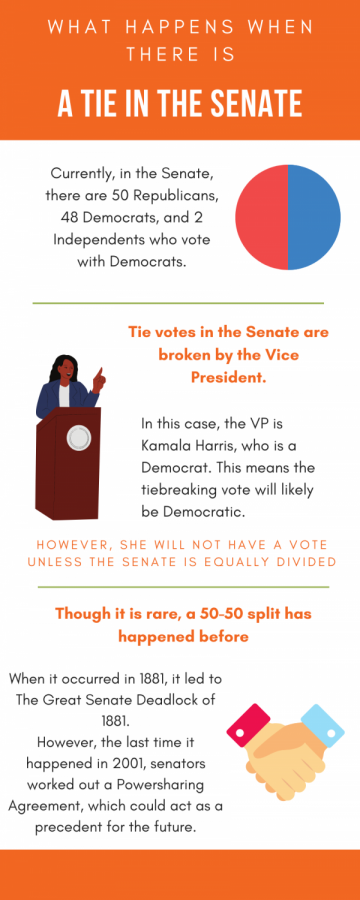Why it’s annoying to hear that the Democrats now control the Senate
A tie in the Senate is uncommon, but not unprecedented.
January 28, 2021
After two Democratic senators, Jon Ossoff and Raphael Warnock, won the Senate election in Georgia, the Senate is now split 50-50 between Democrats and Republicans. In this case, the tie-breaking vote is given to the Vice President, Democrat Kamala Harris. Nonetheless, it would not be entirely accurate to say the Democrats control the Senate.
Historically, a 50-50 tie in the Senate is rare but has definitely happened before. In 1881-1882, the Great Senate Deadlock of 1881 occurred when there were an equal number of Democratic and Republican senators.
“One barrier that Biden will encounter is the need to placate members within his own party, who may decide what legislation gets through or not. In this case, his power is limited in the sense that he will have to extensively negotiate not only with the opposing party, but also within the Democratic Party in order to pass legislation,” said president of the Model Congress club Sri Kondapalli (‘21).
As a result, the executive branch will be less efficient, which also decreases the effectiveness of the government as a whole.
“This will reduce the likelihood of Biden being able to pass all of his desired agenda items and campaign promises, somewhat weakening the role of the executive branch in fulfilling the vision that got him elected in 2020,” said Kondapalli.
While it is true that statements like these were once a fair way to describe who holds more power, America’s political climate has changed significantly in recent decades.
“In recent years there has been an increase in the divide between parties, and statements such as that may not be the best way to phrase it as it would only drive a wedge further between them,” said co-president of Junior State of America, Raahim Nawaz (’23).
The phrase “Democrats now control the Senate” makes it seem like Democrats have completely dominated the government and are able to pass any policies that align with their ideology and oppose Republicans. However, this treats each party as a complete, homogenous group, which is not always the case.
“I think [that phrase] is not entirely true, as it is more the case that [Democrats] have a very tenuous hold. They must appease all factions within the party in order to get bills passed, and to ensure reelection,” said Kondapalli.
While this phrase is commonly used in the media today, a Democratic majority in the Senate does not necessarily mean Democrats control it; rather, they need to balance a variety of factors to ensure the government runs smoothly.





